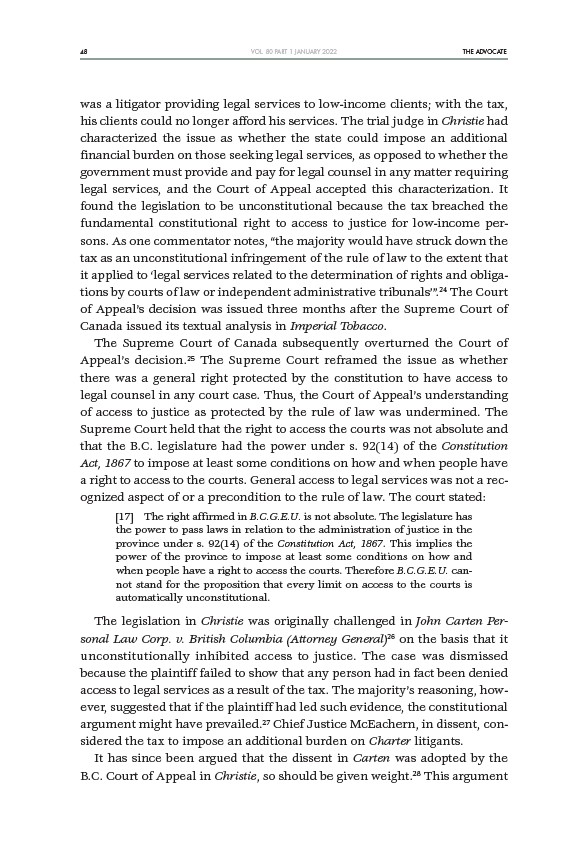
48 THE ADVOCATE
VOL. 80 PART 1 JANUARY 2022
was a litigator providing legal services to low-income clients; with the tax,
his clients could no longer afford his services. The trial judge in Christie had
characterized the issue as whether the state could impose an additional
financial burden on those seeking legal services, as opposed to whether the
government must provide and pay for legal counsel in any matter requiring
legal services, and the Court of Appeal accepted this characterization. It
found the legislation to be unconstitutional because the tax breached the
fundamental constitutional right to access to justice for low-income persons.
As one commentator notes, “the majority would have struck down the
tax as an unconstitutional infringement of the rule of law to the extent that
it applied to ‘legal services related to the determination of rights and obligations
by courts of law or independent administrative tribunals’”.24 The Court
of Appeal’s decision was issued three months after the Supreme Court of
Canada issued its textual analysis in Imperial Tobacco.
The Supreme Court of Canada subsequently overturned the Court of
Appeal’s decision.25 The Supreme Court reframed the issue as whether
there was a general right protected by the constitution to have access to
legal counsel in any court case. Thus, the Court of Appeal’s understanding
of access to justice as protected by the rule of law was undermined. The
Supreme Court held that the right to access the courts was not absolute and
that the B.C. legislature had the power under s. 92(14) of the Constitution
Act, 1867 to impose at least some conditions on how and when people have
a right to access to the courts. General access to legal services was not a recognized
aspect of or a precondition to the rule of law. The court stated:
17 The right affirmed in B.C.G.E.U. is not absolute. The legislature has
the power to pass laws in relation to the administration of justice in the
province under s. 92(14) of the Constitution Act, 1867. This implies the
power of the province to impose at least some conditions on how and
when people have a right to access the courts. Therefore B.C.G.E.U. cannot
stand for the proposition that every limit on access to the courts is
automatically unconstitutional.
The legislation in Christie was originally challenged in John Carten Personal
Law Corp. v. British Columbia (Attorney General)26 on the basis that it
unconstitutionally inhibited access to justice. The case was dismissed
because the plaintiff failed to show that any person had in fact been denied
access to legal services as a result of the tax. The majority’s reasoning, however,
suggested that if the plaintiff had led such evidence, the constitutional
argument might have prevailed.27 Chief Justice McEachern, in dissent, considered
the tax to impose an additional burden on Charter litigants.
It has since been argued that the dissent in Carten was adopted by the
B.C. Court of Appeal in Christie, so should be given weight.28 This argument